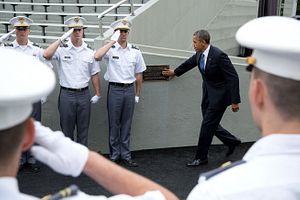President Barack Obama’s speech at West Point was many things to many people. Indeed, realists reveled in Obama’s preference to act only when core interests are threatened, and liberals enjoyed the willingness to work multilaterally and, on occasion, via institutions. Naturally, his political allies and foes praised and eschewed his speech, respectively, without giving it much serious thought.
In the end, these short-lived comments won’t mean much. What does matter is where this speech places Obama’s foreign policy in relation to other American presidents. Sadly, his place in the pantheon will not be reserved, simply because Obama failed to detail his own personal “brand” of foreign policy. Instead, he will be remembered for being the president who defined his foreign policy by wholeheartedly opposing or supporting his predecessors’ policies instead of charting his own unique course.
Obama was careful to toe the line drawn by past presidents, never swaying toward one side or the other, positing that the U.S. role in the world should be some place in the middle. The problem was he did not articulate what he wanted the United States to do in that middle space, which Fred Kaplan notes is “so broad almost anyone could walk [in] it.” Ultimately, Obama’s proposed operating manual will take a little bit from realism and a little bit from liberalism — in essence, the neo-liberal model most associated with Robert Keohane and Joseph Nye. But what will this new American operating manual allow the United States to achieve? This remains unclear.
What is clear is that this speech was meant to break away from the George W. Bush “preemption” model, even if Obama carried over Bush’s counterterrorism policies such as a reliance on drones and building partner capacity to deal with the threat. The speech was a reset for the United States, but Obama refused to outline how the new version of the game will be played. That is to be the job of his successor, who will now have to define the priorities of the United States. If they continue to be as amorphous as halting terrorism, then they will squander this rare opportunity where the American position is among its highest in history, according to the president. To be fair, Obama is dealing with unprecedented challenges that would give any president pause in trying to define a rigid framework. However, that does not mean he cannot propose some concrete priorities.
Using Obama’s framework, there were things he could have begun to list as quintessential American interests and priorities. First, he could have emphasized America’s commitment to striking economic deals that are in the best interest of all parties involved (the omission of the Trans-Pacific Partnership and the Transatlantic Trade and Investment Partnership was especially striking). Second, he could signal America’s willingness to take part in a new form of great power relationship with China instead of slowly drifting toward conflict. There was also a chance to delineate how the United States aims to operate in an ever-changing world where non-state actors are becoming as powerful as states on the global stage. All of these are unquestionably hard, but they are also unquestionably necessary.
Obama’s successor will have to begin with these and other lingering issues, making the need for a coherent strategic framework an imperative. The Middle East is in shambles; Africa is turning into both an important global opportunity and a geopolitical liability; China continues to jealously guard the Asia-Pacific; Europe is worryingly moving to the political right, frustrating the European Union’s plans; and Latin America is seeing a rise in populism that may threaten the progress it has made in recent years. If there was ever a time for a president to outline what the U.S. role should be and what it should do, it would be now. Instead, Obama punted and will let the next president devise policies on these and other issues.
The Obama presidency certainly has a place in history. He is the first African-American president. While imperfect and partisan, he ushered in a massive new health law. And while the economic recovery left much to be desired, the actions of his administration staved off an even greater economic collapse. But on the global stage, the president cannot claim to have defined a new era of foreign policy. He simply continued or severed off bits and pieces of existing ones, making a collage of policies that, inevitably, yield only mixed results.
And that’s it. There’s nothing more. When it comes to foreign policy, Obama’s chance to define a new course has faded away along with his chances of making the foreign policy history books.
Alex Ward is a program assistant in the Atlantic Council’s Brent Scowcroft Center on International Security, where he works on U.S. defense policy and strategy.

































